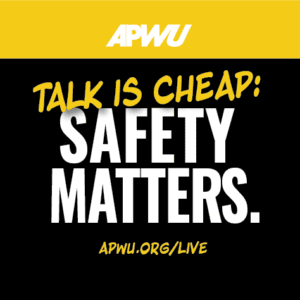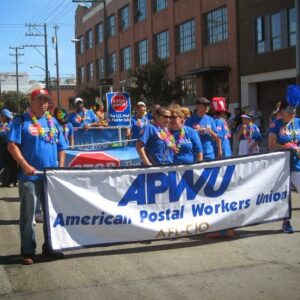November 12, 2021
Negotiations Still Ongoing As Clock is Stopped
(This article first appeared in the November/December issue of the American Postal Worker magazine)
On September 20 2021 the Collective Bargaining Agreement was set to expire at midnight. As the deadline approached the Core Negotiating Committee (President Executive Vice-President Secretary-Treasurer Industrial Relations Director and the four Craft Directors) met to discuss how to proceed. The Committee felt that there was sufficient progress in negotiations to “stop-the-clock” and continue negotiating. The Committee’s vote was unanimous.
‘Stopping the clock’ meant that all provisions and MOUs under the 2018-2021 contract continued in full force and effect. Your negotiators have continued to meet with their counterparts at the Postal Service. The APWU’s Chief Negotiator (President Dimondstein) Craft Directors and I (Chief Spokesperson) are continuing to negotiate with our counterparts and progress continues to be made.
Since September 20 2021 the Committee has continued meeting regularly to discuss and analyze how negotiations are proceeding. The Committee also discusses what the next steps will be. Main Table meetings with the Postal Service have continued since September 20. Both the APWU Core Committee and the Postal Service team attends. The last Main Table meeting occurred on November 8 2021.
I understand how important the contract is to you and your family. I want you all to have answers on the what your contract will be. By the time you are reading this there is a chance that either a voluntary agreement will have been tentatively reached or the Committee will have taken the next step and moved into the mediation process which is taken as a last attempt prior to interest arbitration.
Postal Workers are Protected by OSHA Safety Standards
The US Postal Service is unique when it comes to the applicability of the Occupational Safety and Health Act of 1970 (OSH Act) on federal agencies. This is the law that established the Occupational Safety and Health Administration (OSHA).
Under the Postal Reorganization Act of 1970 the Postal Service was placed under Section 19 of the OSH Act. This did nothing more than require the Postal Service to establish a safety program to help prevent injuries and accidents keep records of any injuries/accidents and report these statistics. OSHA did not have any enforcement authority over safety at the Postal Service. In 1998 the Postal Employees Safety Enhancement Act (PESEA) was passed. This made the Postal Service subject to Public Law Number 91-596 subjecting the Postal Service to OSHA safety standards. OSHA can now do inspections issue citations penalties and criminal referrals.
Under the PESEA postal employees gained rights that other federal employees do not have. Falling under OSHA has benefitted postal employees given them more rights and led to better enforcement of safety regulations. When OSHA issues new and updated safety standards the Postal Service is subject to them. The parties cannot pick and choose what OSHA safety standards are followed/enforced and which ones are not.
COVID-19 Remains Dangerous
I want to remind everyone that COVID-19 is still a threat and safety concern. The APWU encourages everyone to practice those precautions that help prevent and slow the spread of the virus. Wear a face covering wash your hands regularly and practice social distancing when possible. The APWU also encourages all employees who are medically able to receive one of the authorized vaccines against COVID-19. I have been vaccinated and received my booster shot.
Any postal employee who is diagnosed with COVID-19 is able to apply for workers’ compensation benefits (OWCP). Changes to the law made it much easier to apply for and be approved. It is important to apply for benefits for a variety of reasons. You can be compensated for missed work and your medical treatment is paid for. Since no one knows the long-term effects of the disease having an approved claim ensures your future medical treatment related to COVID-19 is paid for as well. Please contact your local with questions on how to apply for benefits.
Solidarity!
Sign up for News



